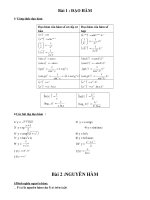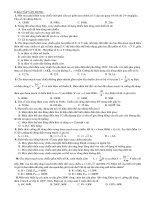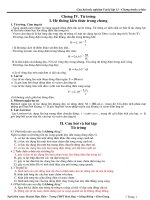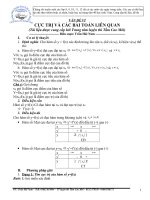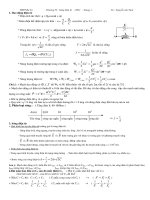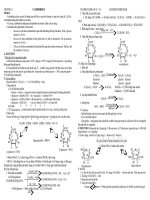Verb Tenses ( ly thuyet va bai tap)
Bạn đang xem bản rút gọn của tài liệu. Xem và tải ngay bản đầy đủ của tài liệu tại đây (118.4 KB, 5 trang )
Simple Present – Hiện Tại Đơn
Cấu trúc:
(+) S + V-s/es
(-) S + do/does not+ V
(?) Do/Does + S + V?
Cách dùng:
1. Diễn đạt chân lý, thói quen, hành động lặp đi lặp lại, hoàn cảnh không thay đổi,
tình cảm và mong muốn
• The sun rises in the east. (a truth)
• I wake up at seven o'clock. (a habit)
• She meets me every Sunday. (a repeated actions)
• I work in New York. (an unchanging situation)
• I love blue flowers. (an emotion)
• He wants to pass his last exam (a wish)
2. Diễn đạt sự sắp xếp, kế hoạch hay lịch trình
• Your flight takes off at 09.00
• My exams start on Monday.
3. Hướng dẫn hay chỉ đường
• You walk for two hundred metres, then you turn left.
• Open the packet and pour the contents into hot water.
Các trạng từ thường dùng
- Always, usually, often, not often, sometimes, occasionally, never;
- Everyday, every week/month/year , on Mondays, Tuesdays, , Sundays.
- Once/twice / three times a week/month/year ;
- Every two weeks, every three months (a quarter)
- Whenever, every time, every now and then, every now and again, every so
often
Present Continuous – Hiện Tại Tiếp Diễn
Cấu trúc:
S + is/am/are + V-ing
S + is/am/are not+ V-ing
Is/Am/Are + S + V-ing ?
Cách dùng:
1. Mô tả 1 hành động đang diễn ra tại thời điểm này
• You are using the Internet.
• You are studying English grammar.
2. Mô tả một hành đông hay một sự kiện trong tương lai, mà được lên kế hoạch hay
chuẩn bị trước
• We're going on holiday tomorrow.
• I'm meeting my boyfriend tonight.
3. Mô tả một sự kiện hay một hoàn cảnh nhất thời
• He usually plays the drums, but he's playing bass guitar tonight.
• The weather forecast was good, but it's raining at the moment.
Simple Past – Quá Khứ Đơn
Cấu trúc:
S + V-ed S + was/were
S + did not+ V S + was/were not
Did + S + V ? Was/were + S
Cách dùng:
1. Diễn tả hành động thường xuyên, 1 lần, không bao giờ hoặc vài lần trong quá khứ
• He drove to the beach every Sunday.
• I used to swim in this river when I was small.
• Did he come to your party last week?
2. Mô tả các hành động lần lượt diễn ra trong quá khứ
• He came in, said hello to everyone in the house and left for his room
immediatly.
3. Mô tả một hành động hay một sự kiện xảy ra tại một thời điểm xác định trong quá
khứ
• I ate lunch at noon today.
• He drove to work yesterday.
4. Các trạng từ thường dùng:
• Yesterday, last week/month/year, ago (two days ago, three months ago,
long long ago )
• In the past, in those days,
5. Cách dùng " Used to"
Used to(nghĩa là: "đã từng"): được dùng để chỉ hành động/thói quen trong quá
khứ, và đã chấm dứt trong quá khứ.
• He used to play the guitar when he was a student.
1
Past Continuous – Quá Khứ Tiếp Diễn
Cấu trúc
S + was/were + V-ing
S + was/were + V-ing
Was/Were + S + V-ing ?
Cách dùng:
1. Mô tả 1 hành động đang diễn ra thì bị gián đoạn bởi 1 hành động hay 1 sự kiện
khác
a. I was watching TV when she called.
b. When the phone rang, she was writing a letter.
c. While we were having the picnic, it started to rain.
2. Mô tả hai hành động đang diễn ra song song tại cùng một thời điểm trong quá khứ
a. I was studying while he was making dinner.
b. While Ellen was reading, Tim was watching television.
Present Perfect – Hiện Tại Hoàn Thành
Cấu trúc
S + have/has + PP
S + have/has not+ PP
Have/Has + S + PP?
Cách dùng
1. Mô tả một hoàn cảnh bắt đầu trong quá khứ và kéo dài tới hiện tại
a. I have lived in New York for nine years.
b. We have been here since Friday.
2. Mô tả một hành động được thực hiện trong một khoảng thời gian mà vẫn chưa
được hoàn thành
a. James has not finished his homework yet.
b. Bill has still not arrived.
3. Diễn đạt một hành động lặp đi lặp lại trong một khoảng thời gian không xác định
giữa quá khứ và hiện tại
a. I have seen that movie twenty times.
b. I think I have met him once before.
c. Nobody has ever climbed that mountain.
4. Diễn đạt một hành động được hoàn thành trong quá khứ rất gần với hiện tại (dùng
với just và recently)
a. He has just broken his leg
b. Recently, I haven't seen any changes in petrol price.
5. Diễn đạt một hành động khi thời gian là không quan trọng, nó được diễn đạt như
một kinh nghiệm
a. I have been to France.
b. Doctors have cured many deadly diseases.
6. Các trạng từ thường gặp
a. Since :Since + thời điểm (since 1990, since last week/month/year;
since I last saw him )
b. For :For + khoảng thời gian (for two days, for the past/last
two months, for the last two years ).
c. Already, just, yet, recently, lately, ever, never
d. This is the first/second/third time.
Present Perfect Continuous – Hiện Tại Hoàn Thành Tiếp Diễn
Cấu trúc
S + have/has + been + V-ing
S + have/has not+ been + V-ing
Have/Has + S + been + V-ing?
Cách dùng
1. Mô tả một hành động xảy ra trong quá khứ và còn tiếp tục ở hiện tại
a. They have been talking for the last hour. (= they are still talking now)
b. What have you been doing for the last 30 minutes?
2. Mô tả một hành động đã kết thúc, nhưng chúng ta chỉ quan tâm tới kết quả của
hành động
a. It's been raining (= and the streets are still wet).
b. Someone's been eating my chips (= half of them have gone).
c. Have you been smoking ?(= you have smell of smoke).
Past Perfect – Quá Khứ Hoàn Thành
Cấu trúc
S + had + PP
S + had not+ PP
Had + S + PP?
Cách dùng
1. Mô tả một hành động kết thúc trước một sự kiện khác trong quá khứ
a. I did not have any money because I had lost my wallet.
2
b. Kristine had never been to an opera before last night.
2. Các trạng từ thường gặp
a. Before, after, never, ever,
b. For + khoảng thời gian + before/after
c. When S + V-ed, S +had +P2
Future Simple – Tương Lai Đơn
Cấu trúc
S + will/shall + V
S + will/shall not + V
Will/Shall + S + V
Cách dùng
1. Dự đoán trong tương lai
a. The course will start in May.
b. It will rain tomorrow.
2. Diễn đạt một quyết định tức thì (Dùng với I và We)
a. We will pay by cash in stead.
3. Diễn đạt sự sẵn lòng hay không sẵn lòng
a. I will not do your homework for you.
b. Will you make dinner?
4. Đưa ra lời mời, đề nghị, đề xuất
a. Shall we go to the restaurant tonight? (a suggestion)
b. Shall I bring you something to drink? (an offer)
c. Will you come to the dance with me? (an invitation)
5. Đưa ra mệnh lệnh, chỉ dẫn hoặc lời khuyên
a. What shall I tell the boss about this money? (an instruction)
You will do exactly as I say. (an order)
Past Perfect Continuous – Quá Khứ Hoàn Thành Tiếp Diễn
Cấu trúc
S + had + been + V-ing
S + had not + been + V-ing
Had + S + been + V-ing
Cách dùng
1. Mô tả một hành động xảy ra trong quá khứ và kéo dài tới khi một hành động khác
xảy ra
a. He had been playing game for over an hour before Tony arrived.
b. How long had you been waiting to get on the train?
2. Nguyên nhân của một sự việc trong quá khứ
a. Tom was tired because he had been exercising for hours.
b. I failed the exam because I had not been attending the class.
Future Continuous - Tương Lai Tiếp Diễn
Cấu trúc
S + will be V-ing
S + will not be V-ing
Will + S + be V-ing
Cách dùng
Chỉ một việc sẽ xảy ra trong một thời gian nhất định ở tương lai, hoặc khi một việc khác
xảy ra
• By the time next week, we will be learning English
Future Perfect – Tương Lai Hoàn Thành
Cấu trúc
S + will have + PP
S + will have not + PP
Will + S + have + PP
Cách dùng
1. Diễn đạt một hành động xảy ra trước một sự kiện trong tương lai
a. You can call me at work at 8am. I will have arrived at the office by 8.
Future Perfect Continuous – Tương Lai Hoàn Thành Tiếp Diễn
Cấu trúc
S + will have been + V-ing
S + will have not + been + V-ing
Will + S + have + been + V-ing
Cách dùng
1. Diễn đạt một hành động xảy ra cho đến khi một sự kiện hay một thời gian khác
xảy ra trong tươn lai
a. They will have been talking for over an hour by the time Thomas
arrives.
b. How long will you have been studying when you graduate?
3
Simple Present / Present Continuous
1. Every Monday, Sally (drive) her kids to football practice.
2. Usually, I (work) as a secretary at ABT, but this summer I
(study) French at a language school in Paris. That is why I am in Paris.
3. Shhhhh! Be quiet! John (sleep) .
4. Don't forget to take your umbrella. It (rain) .
5. I hate living in Seattle because it (rain, always) .
Simple Past / Past Continuous
1. A: What (you, do) when the accident occurred?
B: I (try) to change a light bulb that had burnt out.
2. After I (find) the wallet full of money, I (go,
immediately) to the police and (turn) it in.
3. The doctor (say) that Tom (be) too sick to go to work
and that he (need) to stay at home for a couple of days.
4. Sebastian (arrive) at Susan's house a little before 9:00 PM, but she (be,
not) there. She (study, at the library) for her
final examination in French.
Simple Past / Present Perfect
1. A: Did you like the movie "Star Wars?"
B: I don't know. I (see, never) that movie.
2. Sam (arrive) in San Diego a week ago.
3. My best friend and I (know) each other for over fifteen years. We still
get together once a week.
4. Stinson is a fantastic writer. He (write) ten very creative short stories in
the last year. One day, he'll be as famous as Hemingway.
5. I (have, not) this much fun since I (be) a kid.
Present Perfect / Present Perfect Continuous
Robin: I think the waiter (forget) us. We (wait) here
for over half an hour and nobody (take) our order yet.
Michele: I think you're right. He (walk) by us at least twenty times. He
probably thinks we (order, already) .
Robin: Look at that couple over there, they (be, only) here for five or ten
minutes and they already have their food.
Michele: He must realize we (order, not) yet! We
(sit) here for over half an hour staring at him.
Robin: I don't know if he (notice, even) us. He (run)
from table to table taking orders and serving food.
Michele: That's true, and he (look, not) in our direction once.
Present Continuous / Present Perfect Continuous
1. It (rain) all week. I hope it stops by Saturday because I want to go to
the beach.
4
2. Sid: Where is Gary?
Sarah: He (study, at the library) for his German test on
Wednesday. In fact, he (review) for the test every day for the last
week.
3. You look really great! (You, exercise) at the fitness center ?
4. Frank, where have you been? We (wait) for you since 1 PM.
Simple Past / Past Perfect
I can't believe I (get) that apartment. I (submit) my
application last week, but I didn't think I had a chance of actually getting it. When I
(show) up to take a look around, there were at least twenty other people
who (arrive) before me. Most of them (fill, already)
out their applications and were already leaving. The landlord said I could still apply, so I
did.
Past Perfect / Past Perfect Continuous
I'm sorry I left without you last night, but I told you to meet me early because the show
started at 8:00. I (try) to get tickets for that play for months, and I didn't
want to miss it. By the time I finally left the coffee shop where we were supposed to meet, I
(have) five cups of coffee and I (wait) over an hour. I
had to leave because I (arrange) to meet Kathy in front of the theater.
Simple Present / Simple Future
1. Today after I (get) out of class, I (go) to a movie with
some friends.
2. When you (arrive) in Stockholm, call my friend Gustav. He
(show) you around the city and help you get situated.
3. A: Do you know what you want to do after you (graduate) ?
B: After I (receive) my Master's from Georgetown University, I
(go) to graduate school at UCSD in San Diego. I (plan)
to complete a Ph.D. in cognitive science.
Simple Future / Future Continuous
Sandra: Where is Tim going to meet us?
Marcus: He (wait) for us when our train arrives. I am sure he
(stand) on the platform when we pull into the station.
Sandra: And then what?
Marcus: We (pick) Michele up at work and go out to dinner.
Simple Future / Future Perfect
Margaret: Do you think everything will be finished when I get back from the store?
Jerry: Don't worry. By the time you get back, I (pick) up the living
room and (finish) washing the dishes. Everything will be perfect when
your parents arrive.
Margaret: I hope so. They (arrive) around 6 o'clock.
Jerry: Everything (be) spotless by the time they get here.
5
